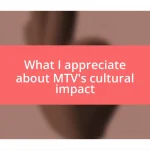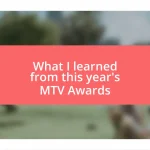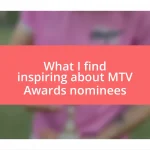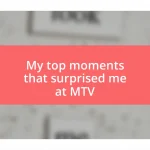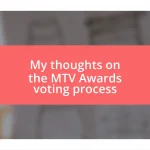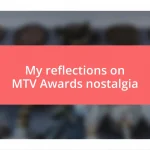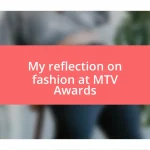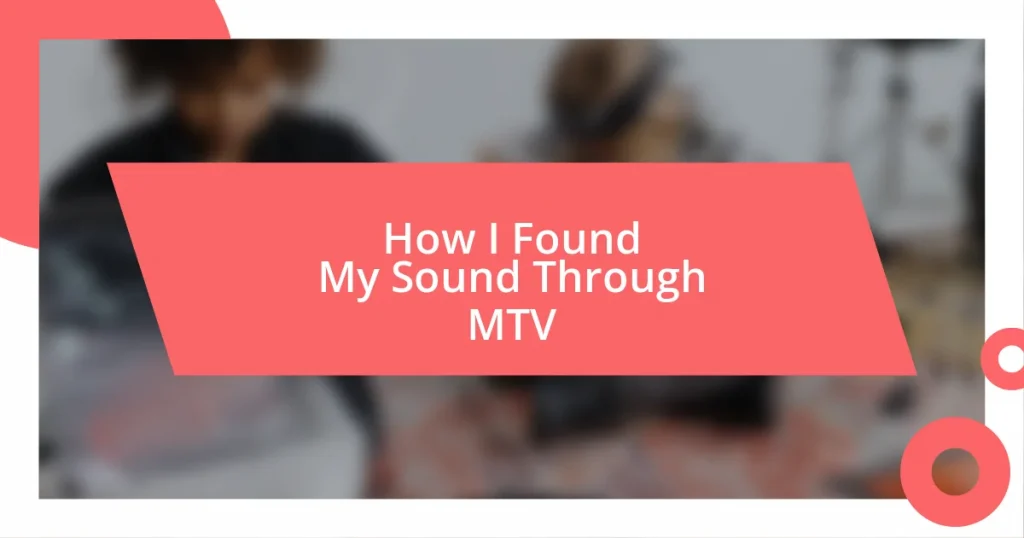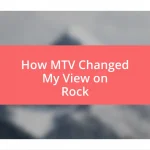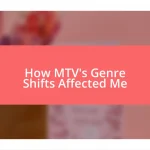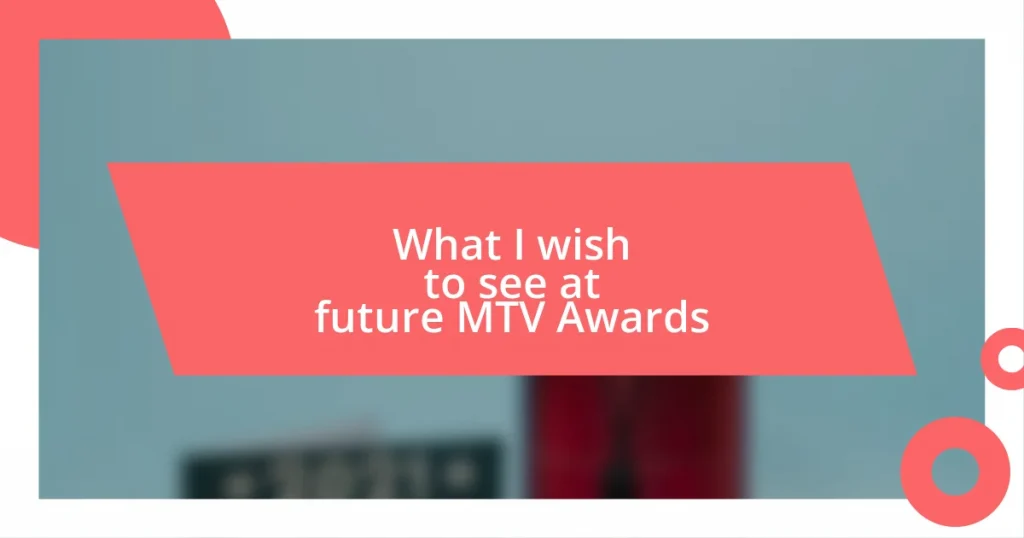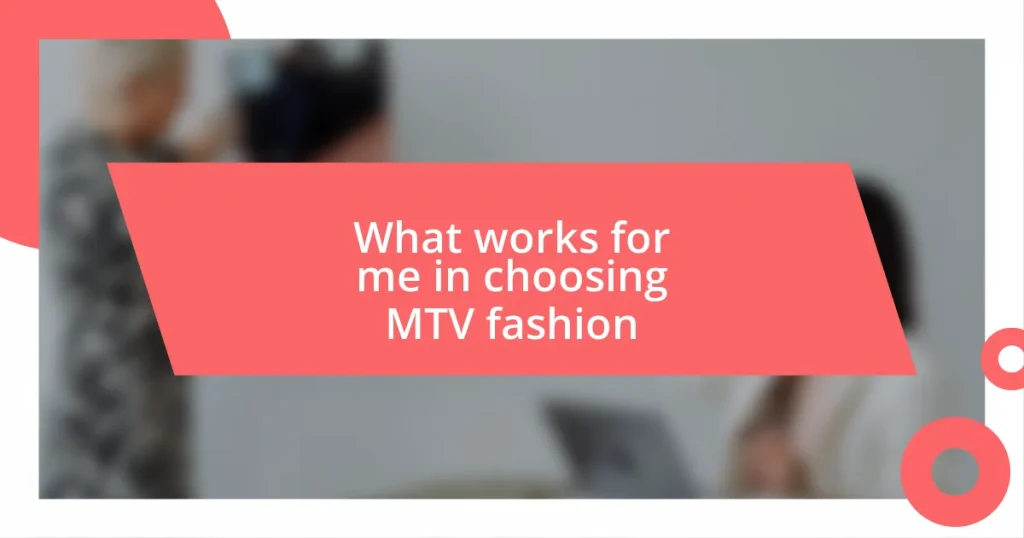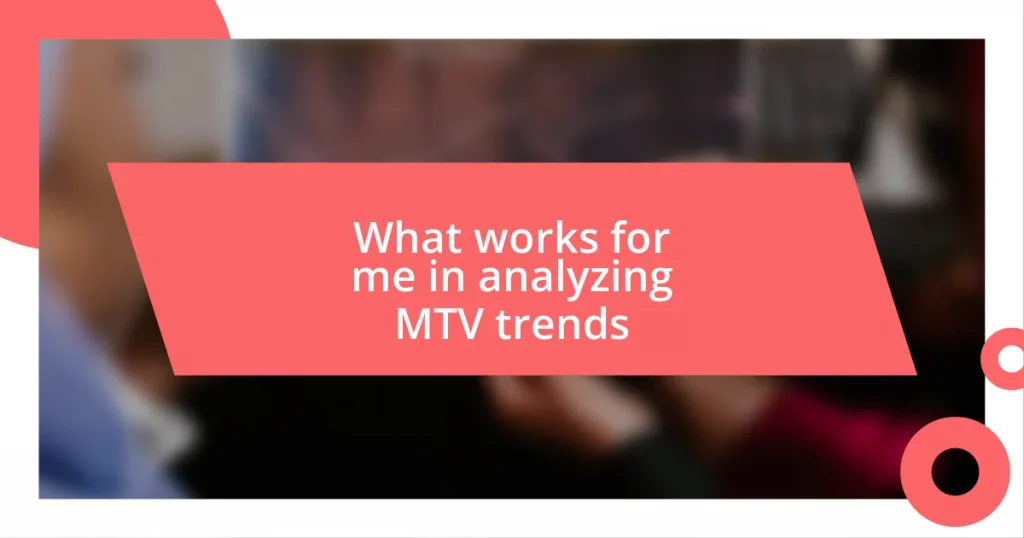Key takeaways:
- Music served as a lifeline during adolescence, shaping identity and providing emotional resonance through experiences like discovering punk and attending concerts.
- MTV was pivotal in expanding musical horizons, introducing diverse artists and genres, and creating a sense of community through shared musical experiences.
- The process of creating a personal music style involved experimentation and self-discovery, blending influences, documenting thoughts, and embracing diversity in sound.
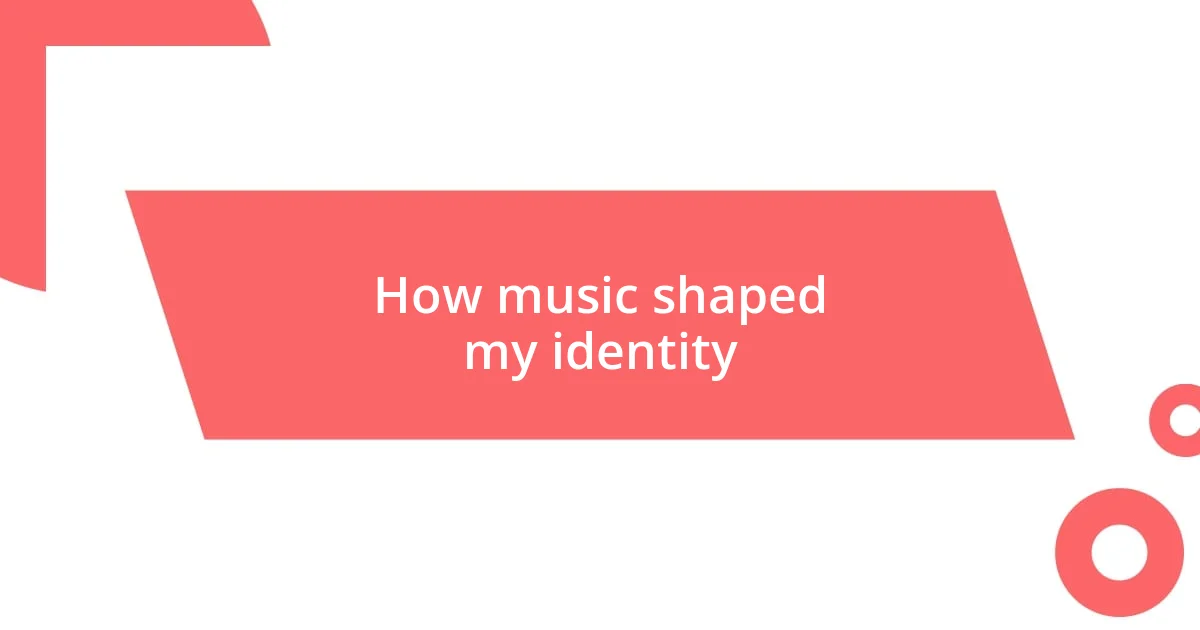
How music shaped my identity
Music has always been more than just background noise for me; it has been a lifeline that sculpted my sense of self. I recall days spent in my room with my headphones on, lost in the world of alternative rock, which somehow mirrored my feelings of isolation as a teenager. Each song felt like a companion, whispering that I wasn’t alone in my struggles.
Thinking back, I can’t help but wonder how many identities I shaped through the melodies and lyrics I embraced. Discovering punk music, for instance, ignited a rebellious streak in me. I vividly remember my first mosh pit experience—it was chaotic yet exhilarating, opening my eyes to a community where individuality was celebrated.
There was a moment when I belted out a ballad after a heartbreaking experience, feeling vulnerable yet empowered. It struck me then just how deeply music resonates with our emotional experiences and decisions. I often ask myself, would I be the same person without those powerful tracks shaping my journey? Music has become a mirror reflecting my evolving identity, illustrating my highs and lows in a way that words alone could never capture.
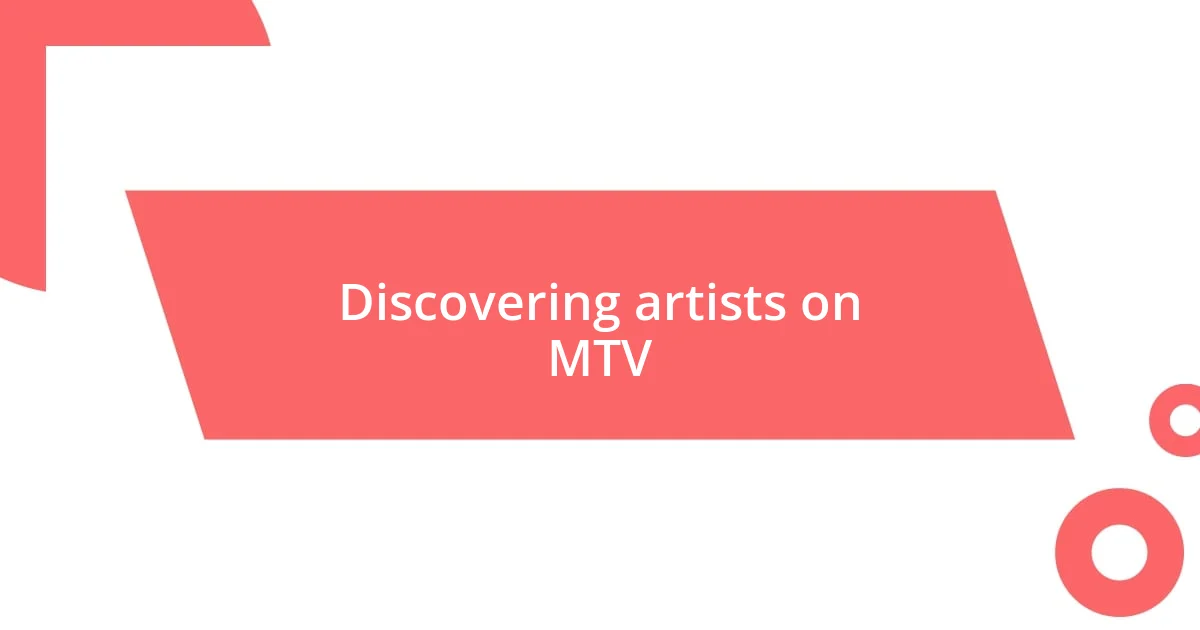
Discovering artists on MTV
Discovering music through MTV was like peeling back layers of a vibrant cultural onion. I remember flicking on the TV after school, and there it was, an endless array of artists and genres swirling before my eyes. Each time a new artist appeared, it felt as though I was being introduced to a friend, someone who might just understand what I was going through at that moment, whether it was the angst from a pop-punk anthem or the soulful introspection of an R&B ballad.
One particular afternoon, I caught a glimpse of an up-and-coming band performing a song that mirrored my feelings of uncertainty about the future. The raw energy and authenticity were intoxicating; I felt an immediate connection that made me dive into their discography. MTV opened my eyes to a plethora of talent, allowing me to discover not just songs I loved, but entire communities of fans who resonated with the same artistry.
My journey of finding artists didn’t stop with mainstream hits. I recall digging deeper while watching shows that showcased lesser-known musicians. That’s when I stumbled upon acoustic sets that brought a whole new dimension to my understanding of sound. It suddenly clicked: music had the power to change the narrative of my life and inform my own artistic expression.
| Artist | Genre |
|---|---|
| Linkin Park | Nu-Metal |
| Aaliyah | R&B |
| The White Stripes | Alternative Rock |
| Paramore | Pop-Punk |
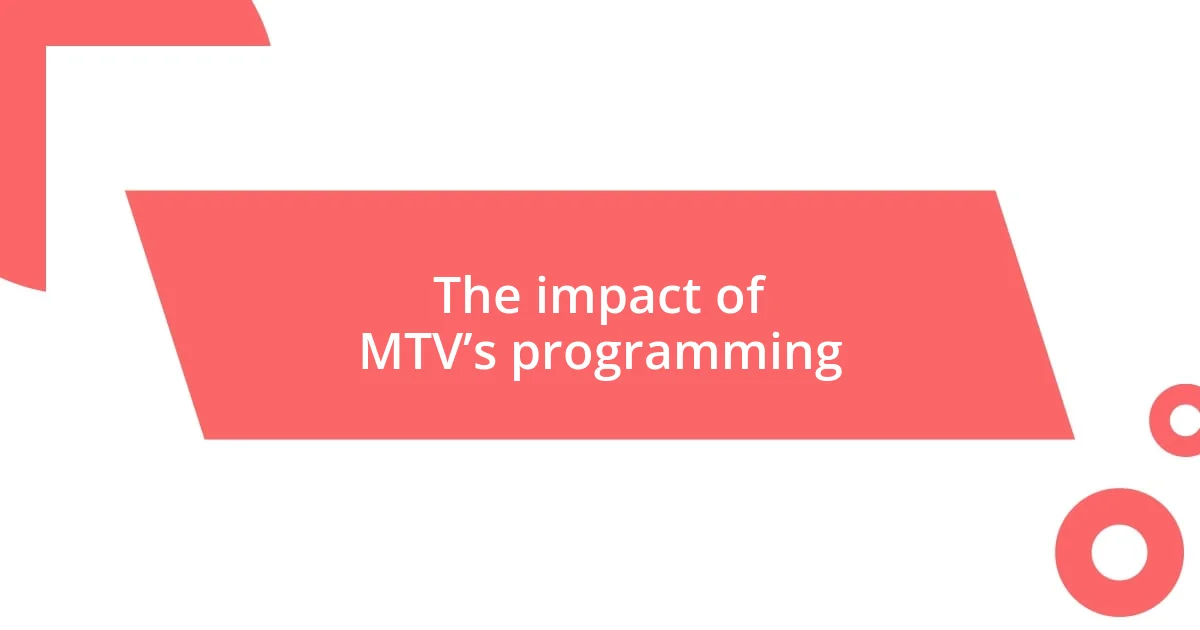
The impact of MTV’s programming
It’s fascinating how MTV’s programming allowed me to witness the evolution of music firsthand. I remember anxiously waiting for “Total Request Live” every afternoon. The countdown combined with the music videos created vibrant energy, making me feel like I was part of something bigger—like I was directly influencing the charts as I cheered for my favorite songs.
- MTV’s diverse programming introduced a wide array of genres, transforming my understanding of music.
- Shows highlighted emerging artists who went on to become icons—people I never would have discovered otherwise.
- The music videos themselves were mini-films that spoke to the emotions I felt but couldn’t articulate.
- I found a sense of belonging through the shared love of music that MTV fostered among its viewers.
Reflecting on it now, I realize how crucial those moments were in shaping my interests and aligning my identity with the artists whose journeys I closely followed. Whether it was finding solace in a grunge anthem or feeling uplifted by a pop hit, each segment on MTV seemed to resonate with my life’s unfolding chapters.
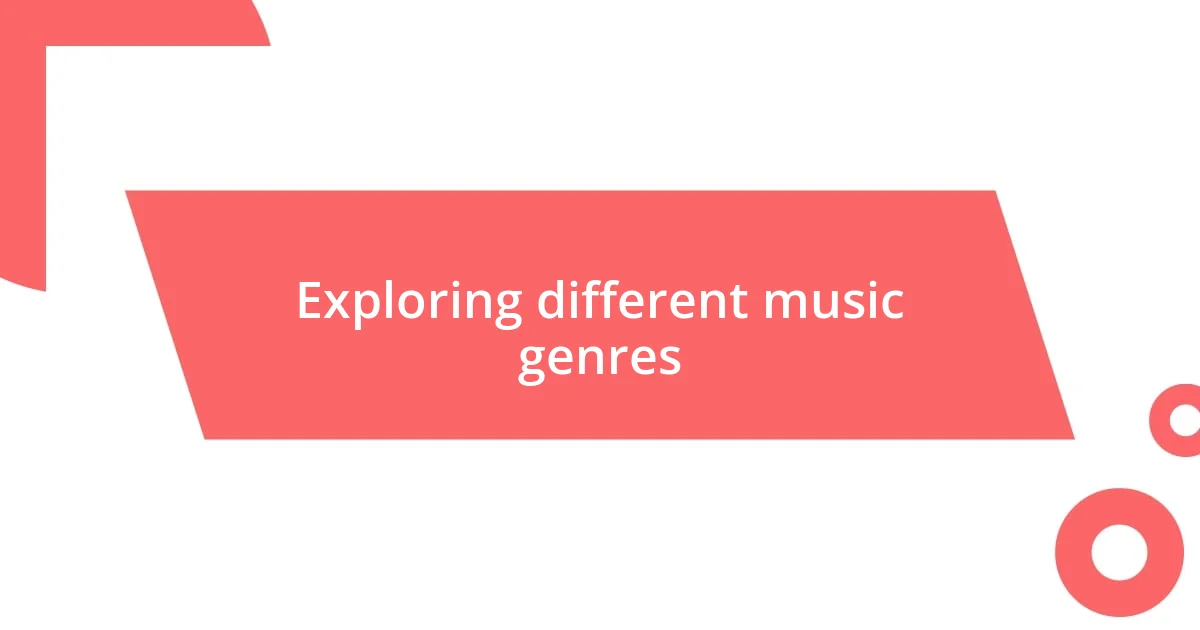
Exploring different music genres
Exploring different musical genres through MTV was like embarking on a treasure hunt for the soul. Each time I tuned in, it felt less like watching TV and more like immersing myself in a vibrant world of sound. I still remember the first time I saw a video for a hip-hop track—it was energetic and bold, making me appreciate the articulate storytelling within the verses. How could a few carefully chosen words resonate so deeply with my daily struggles? It was then I realized the power of language in music.
As I dove deeper, I discovered genres I never knew existed, like ska or indie pop, each with its own quirky vibe and passionate following. One afternoon, I was captivated by a band’s unique blend of upbeat melodies and witty lyrics. It was refreshing! That moment made me ponder how music can evoke such diverse feelings; one song could ignite joy while another coaxed the tears I didn’t know I had. It was all an emotional ride, expertly guided by MTV’s eclectic programming.
The beautiful chaos of the music landscape truly dawned on me when I stumbled onto an alternative rock festival special on MTV. I sat there, mesmerized, absorbing the raw authenticity and individuality of each performer. It struck me—how could such different sounds come together to create a sense of unity? That is the magic of exploring various genres; each style adds a new layer to my musical identity, enriching my experience in ways I never anticipated.
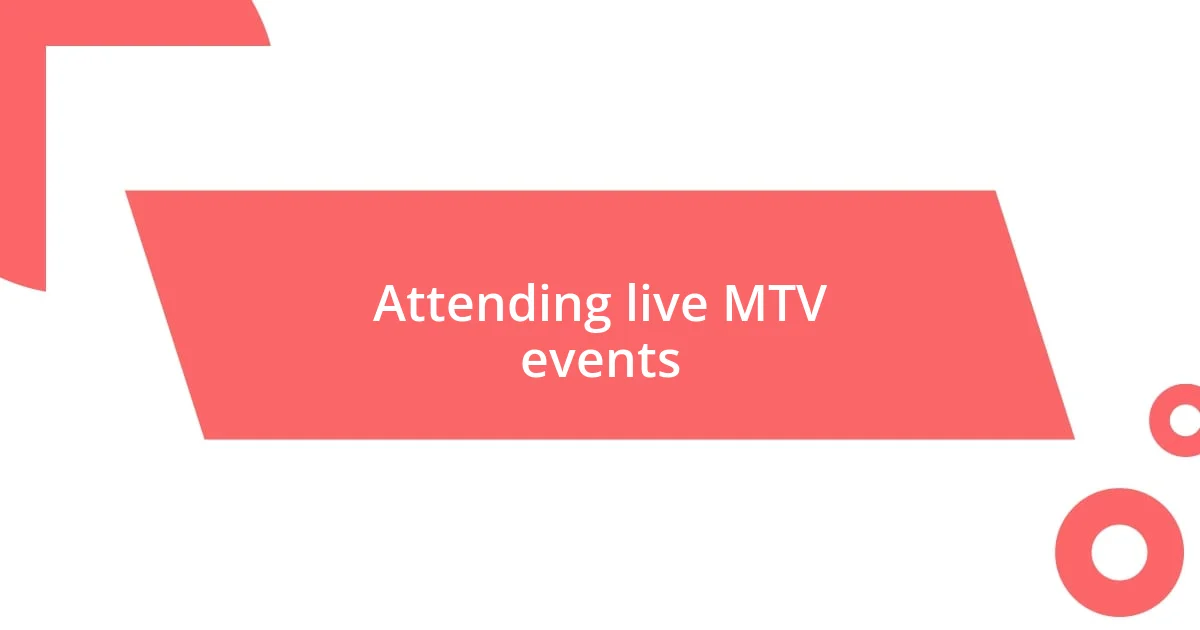
Attending live MTV events
Attending live MTV events was a surreal experience for me, like stepping into a dream where the energy pulsated through every beat. I’ll never forget my first concert; the crowd erupted as the headliner took the stage, and I felt an exhilarating rush surge through me. It was as if the music was binding us all together in a shared moment of ecstasy. Have you ever felt that kind of connection? In that sea of faces, I truly understood the communal power of music.
One night, while at an MTV beach party, I found myself dancing with strangers who felt like instant friends. As the sun set and the music thumped, I caught glimpses of artists mixing with fans, blurring the lines between celebrity and ordinary person. The shared excitement made me realize how accessible music could be, tearing down barriers and fostering a sense of belonging. Can you imagine the thrill of being so close to your idols? It deeply affected how I viewed my own musical aspirations.
Reflecting on these experiences, I understand how they shaped my sound. Each event was not just about adrenaline and lights but also about personal connections. Nostalgia washes over me when I recall the emotional moments—like when a beloved artist played my favorite song, and we all sang along as if we were part of an intimate gathering. Those live performances ignited a spark in me, solidifying my passion for music and inspiring my own creative journey. How could those memories not influence the sounds I resonate with today?
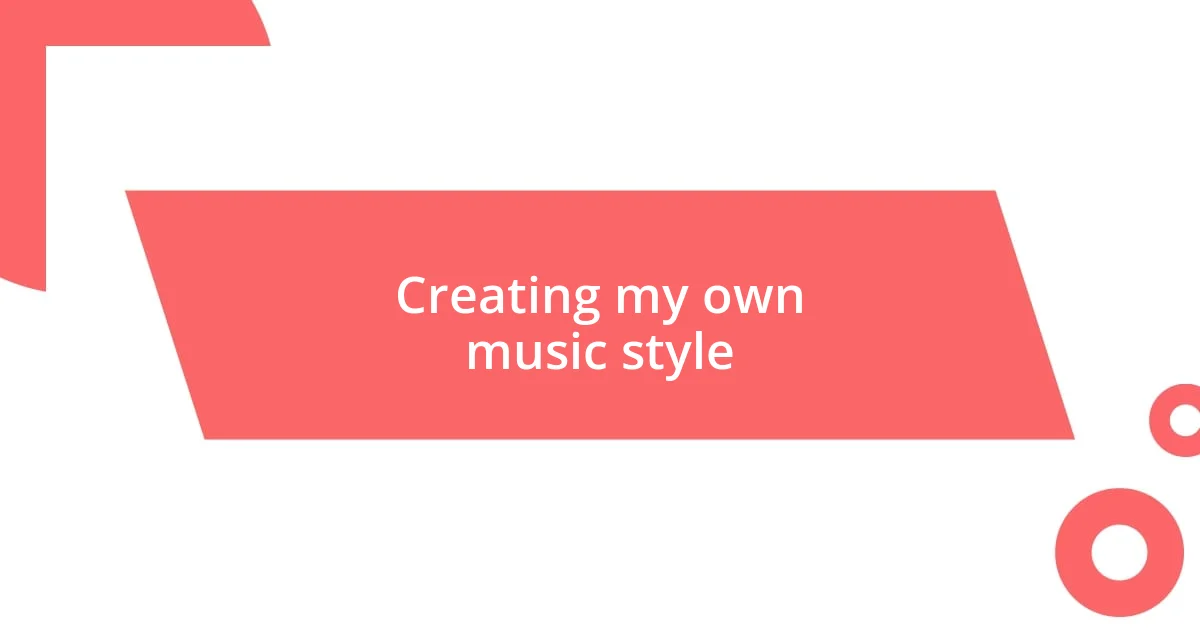
Creating my own music style
Creating my own music style became an adventure in self-discovery. I remember the first time I picked up my guitar and strummed a few chords that resonated with me on an emotional level. It felt like uncovering a hidden part of myself. Have you ever experienced that moment when the right melody just clicks? For me, it was a mix of influences—from the grit of punk rock to the smoothness of R&B—that started to blend together in unexpected ways.
I also found inspiration in the stories told through music. Listening to artists share their journeys, I started penning my own lyrics, drawing from personal experiences. It’s fascinating how a simple phrase can encapsulate so much of what we feel. When I crafted a song about my struggles with self-doubt, it was not just therapeutic; it connected me with others who had similar paths. In those moments of creation, I encountered my authenticity, shaping my sound into something distinctly mine.
Over time, I embraced experimentation wholeheartedly. Each track I produced became a canvas for my evolving style. I recall one experiment where I fused electronic beats with live instruments, and the result was electrifying! How could something so different make me feel so alive? It’s in these moments of daring to be unique that I truly found my voice. My music began to mirror my journey, an ever-changing reflection of my identity, experiences, and dreams.
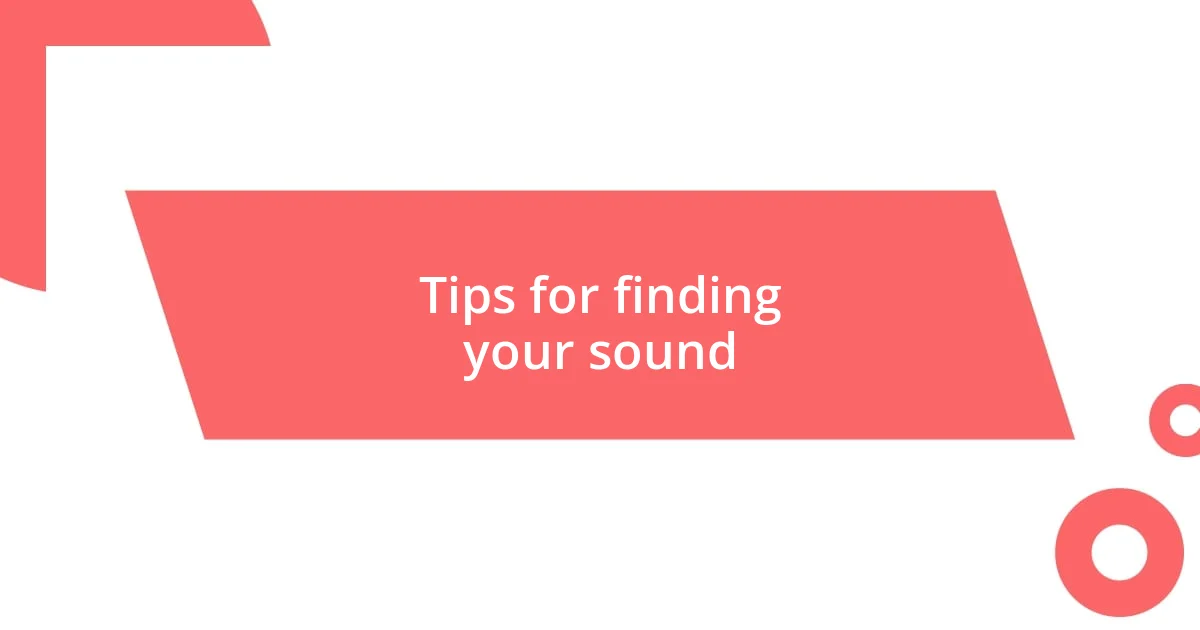
Tips for finding your sound
Finding your sound is an evolving journey that thrives on exploration and openness. I remember spending countless late nights experimenting with different genres. One evening, I stumbled upon a blend of indie and hip-hop while scrolling through MTV’s music videos. The fusion felt like a revelation—melding catchy hooks with rhythmic verses just clicked for me. Have you ever had a moment when you realized a new combination was exactly what you needed? That was mine, and it validated the importance of allowing yourself to play with different styles without restraint.
Another pivotal tip is to keep a music journal. Documenting my thoughts and feeling about various songs I heard became a treasure trove of inspiration. I’d write about how a specific lyric resonated with me or the first time I heard a captivating riff that made my heart race. This practice not only cleared my mind but also provided clarity on what truly moved me. Have you tried writing down your musical thoughts? I found it brings a deeper understanding of what your authentic sound could be.
Surrounding yourself with diverse musical influences can also open up new avenues. I vividly recall attending a local music festival and losing myself in a blend of genres from folk to EDM to jazz. Watching artists from different backgrounds perform ignited something in me. It felt like each performance offered a piece of the puzzle I was trying to complete. How can you ignore the magic that happens when you immerse yourself in varied sounds? That day left an indelible mark on my musical identity, encouraging me to embrace eclecticism rather than confine myself to one genre.



